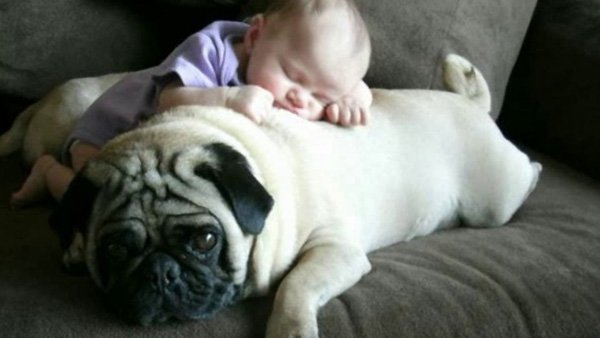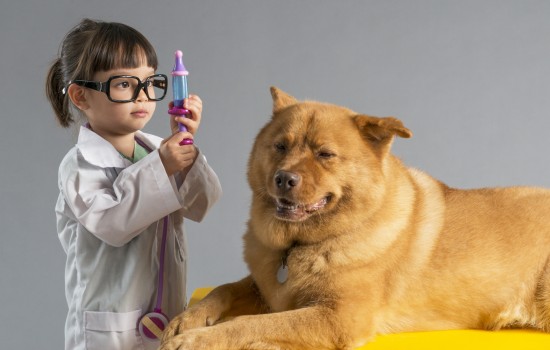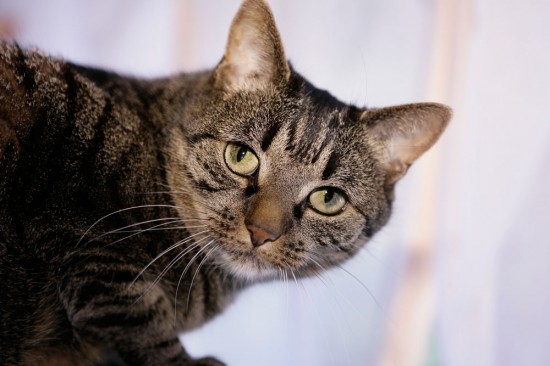
Bloat is one of the most serious health conditions that can affect your dog, and it is imperative that you know what it is and how to recognize it. In this article you will find exactly what bloat, (otherwise known as gastric dilation and volvulus) is, along with the causes of bloat. You will see all of the symptoms of bloat, being alert to them if your dog shows any of these signs. More importantly you'll know what to do, with both immediate veterinary treatment, and holistic options.
Bloat is most often seen in deep-chested dogs such as Great Danes, Dobermans and German Shepherds. Some reports claim that it is the second leading cause of death in certain breeds next to cancer. The stomach distends in response to digesting food and gas production. Some dogs produce more gas, and are more prone to bloat. Following the gas distension, the stomach can twist, called a 'torsion', and then the built up pressure can't escape. This compresses a large vein, the caudal vena cava, cutting off the blood supply to the rest of the abdominal organs.
The symptoms of bloat show as your pet's stomach is swollen with air and fluid. You will see the belly expanded and feel firm like a balloon. Your dog is anxious, very restlessness, and often will appear hunched up. A classic sign which I saw many times in veterinary practice was of a dog attempting to vomit very frequently ( every few-10 minutes), with nothing coming up. This usually happened very suddenly, and often after eating or drinking. As the bloat continues, your dog is in pain, drooling, and trying to vomit. Then this further progresses to signs of shock. The distended stomach loses its blood supply, and causes a loss of blood flow to the rest of the abdominal organs. There can be faster heart rate, pale to grey mucous membranes, weakness and collapse.
Call your veterinarian as soon as possible if you suspect bloat. Pets can die in as little as 15 minutes following a torsion. Your veterinarian can assess your dog, perform an X-ray to confirm the bloat, attempt to pass a stomach tube to relieve the pressure, and if needed, perform surgery to correct the torsion.
In the early stages of bloat, the stomach is distended, but your pet can belch; this means the stomach hasn't yet twisted. Products that contain antacids and simethicone, a foaming agent that pulls gas bubbles together, may help. You can safely give a liquid antacid - Mylanta is very effective. The dose is 1 tablespoon per 10 lbs (your 80 lb Labrador would need 8 tablespoons). Or, you can give the tablet form - ½ tab per 10 lbs. The stomach swelling should start to decrease in 15 minutes. If the swelling doesn't drop, then contact your vet.
Gentle exercise can help move distended fluid and gas through your dog's system. I find this helps my own dog after he has gone through the neighbor's compost. After 15 minutes the swelling should be gone; if not, see your vet now.
Many a dog owner claim that acupressure helps with preventing the expanding stomach from twisting, reversing the signs of bloat. ST36. Found on the outside hind leg, below the knee, in a depression at the front of the leg. Hold it for 60 seconds, and repeat every 5 minutes. This last technique is reserved for pet owners who have a dog prone to bloat, especially if you live a long way from a veterinary clinic. In an emergency, I would put a roll of tape in your dog's mouth, and pass a semi-rigid tube (such as a watering hose). The tube can be pre-measured to the length of the last rib. It should pass into the stomach with moderate pressure, and result in a large release of gas. After this, get to your nearest veterinarian ASAP.
You should now have a good understanding of what bloat ( Gastric dilation and volvulus) is, and be able to recognize the common signs and symptoms if it is to ever affect your dog. One of the more diagnostic signs is sudden, and frequent attempts to vomit, while nothing come up. If your dog has signs of bloat, immediately contact your veterinarian, and in the interim, consider some of the natural remedies, such as the ST36 acupressure point.
Dr Andrew Jones is the author of a NEW Free Ebook, Dog Health Secrets, which gives you over 100 safe, natural and effective at home remedies to solve your dog's health problems quickly and easily at home. He reveals what Vaccines to AVOID and what to give, The BEST food to feed, plus HOW to save money on veterinary fees. Your FREE Dog Health Secrets Book is here
 A Relaxed And Comfortable Bath For Your Dog
A Relaxed And Comfortable Bath For Your Dog
Go
A Relaxed And Comfortable Bath For Your Dog
A Relaxed And Comfortable Bath For Your Dog
Go
 5 Things That Cats Really Don’t Like
5 Things That Cat
5 Things That Cats Really Don’t Like
5 Things That Cat
 Read this Article if You are Against Abuse to Animals
Read this Article if You are Against Abuse to Animals
 How A Family Dog Can Help A Childs Development
How A Family Dog
How A Family Dog Can Help A Childs Development
How A Family Dog
 Stroke In Cats - All About Feline Stroke
Stroke In Cats -
Stroke In Cats - All About Feline Stroke
Stroke In Cats -
Copyright © 2005-2016 Pet Information All Rights Reserved
Contact us: www162date@outlook.com